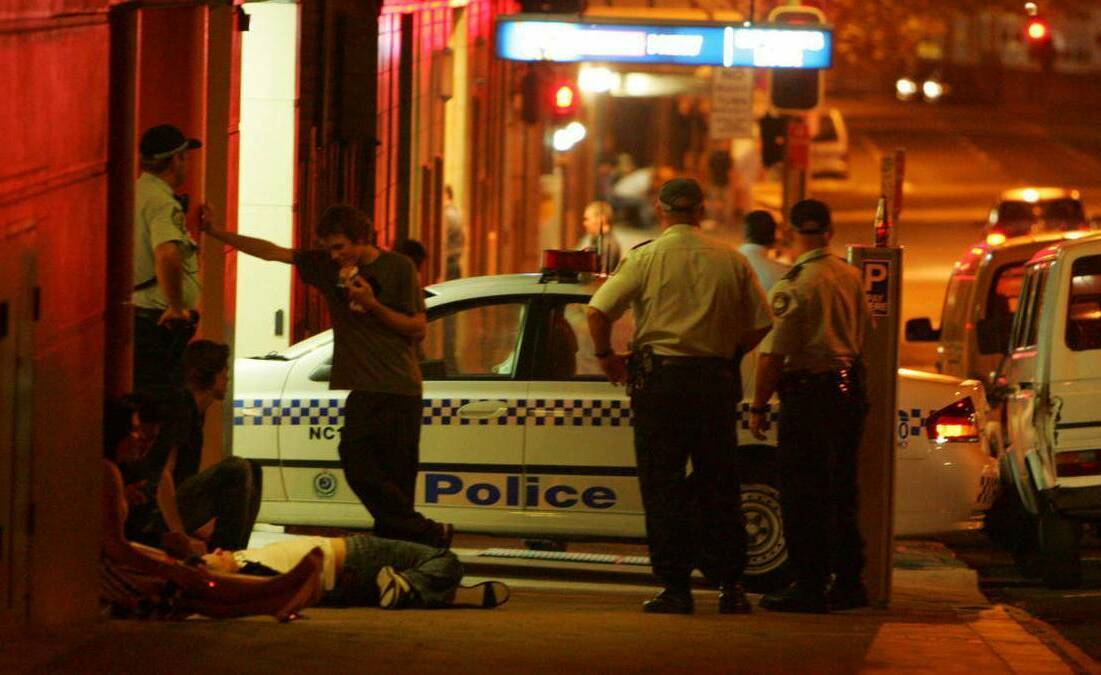
The head of NSW's crime research bureau says it will be up to politicians to monitor assault rates in the post-lockout era after a new study showed tighter regulation led to a dramatic fall in alcohol violence last decade.
The NSW Bureau of Crime Research and Statistics study showed that a suite of public safety measures introduced from 2008 to 2018 cut the number of non-domestic assaults in NSW by 19 per cent across NSW, 45 per cent in the Sydney central business district and 84 per cent in Kings Cross.
The study did not specifically examine the effect of lockouts and other alcohol restrictions in Newcastle, even though the city was the first to introduce restrictions in 2008 following years of alcohol-related violence.
The so-called Newcastle Solution of lockouts, shorter trading hours and limits on the types of drinks sold were rolled out in central Sydney and Kings Cross in 2014 among a series of other measures over the decade.
The BOCSAR study found the regulations had a "significant impact" on the number of assaults in Kings Cross and the Sydney CBD up to 2019.
The previous government scrapped the laws in Sydney in 2019 and 2021 and the Minns government ended Newcastle's stricter rules in July last year.
The government scrapped Newcastle's tighter restrictions even though a 2021-22 trial led to a 65 per cent increase in on-premises assaults and incidents of affray at participating pubs and clubs.
BOCSAR executive director Jackie Fitzgerald said it was now incumbent on decision-makers to pay attention to assault statistics to make sure the changes did not lead to a return to the bad old days in Newcastle and Sydney.
"This is an area where there's vested interests and lobbyists, and you really do need to look at the data, and hopefully future policy decisions can continue to be driven by the facts," she said.
"If we do see an increase in violence that warrants a response, then hopefully we can be honest and open about acknowledging that.
"It's a hot topic and there's money to be made and different agendas.
"We have a good indication about how these laws translate into the safety of the community, and hopefully that will be primary in how the policy landscape goes forward."
Ms Fitzgerald said alcohol violence was no longer the "burning issue" it was when the lockout laws were introduced from 2008 onwards.
"People were describing it as an emergency and the police were treating it like that, like an event every weekend," she said.
"It is a really critical time to look at how things change with non-domestic assault because, even though we've seen these big reductions, that could easily be undone in the next three or five years unless we keep an eye on it."
A state parliamentary committee recommended in 2019 that BOCSAR analyse which of the public safety measures had contributed most to the decline in assaults.
The BOCSAR researchers said their analysis "adds to the mounting evidence that restricting trading hours of licensed venues can substantially reduce the risks associated with acute alcohol intoxication and can be a cost-effective crime reduction strategy when combined with enforcement that targets the small number of premises that account for the majority of harm".
Newcastle anti-violence campaigner Tony Brown, who led a coalition of police, residents and councillors in pushing for the lockout laws in 2008, said the BOCSAR study "undermines the veracity and reliability of the Independent Liquor and Gaming Authority's decision to permanently remove Newcastle's modest harm control conditions".
"The excellent research vindicates genuine concerns expressed by police and senior health officials who daily confront a range of primarily avoidable bloody incidents on our inner-city streets," he said.
"We now believe they have become effectively muzzled against any comments inconsistent with government policy."
He called on police and other frontline health workers to support an independent review of the "governance, objectivity and independence of the full decision-making process culminating in the ILGA approval".
"It defies the robust scientific evidence supporting sensible controls on the availability, supply and strength of alcohol."
Ms Fitzgerald said politicians had to weigh up public health and safety against the competing interests of licensees and civil liberty.
"I don't really have a firm view on what the right policy is, but we can clearly see those policies did result in many fewer assaults and increased safety."







